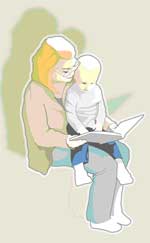- Continuing Medical Education (CME) for Physicians
- Continuing Nursing Education (CNE) for Nurses
- Continuing Education Units (CEU) for Other Professionals
- Continuing Education Contact Hours (CECH) for Certified Health Education Specialists (CHES)
Who is the target audience for this training?
This online training was developed for pediatric health care providers, health educators and other health professionals interested in environmental health anticipatory guidance for pediatric patients and their parents/guardians.

What is this training about?
The Toolkit training is an interactive web-based module that introduces users to the basics of environmental health and explains the purpose and best use of Toolkit materials. It offers health care providers detailed examples about how to best deliver anticipatory guidance on a range of environmental health issues, especially during well-child visits.

The module discusses pediatric health care providers current practices related to environmental health, and provides resources for delivering anticipatory guidance at well child visits to help their patients avoid or mitigate exposures to toxic substances. Taking an environmental history is featured, and resources for further learning (including ATSDR Case Studies in Environmental Medicine and ToxFAQs™) are hyperlinked.
What is in the Pediatric Environmental Health Toolkit and how can I access the Toolkit materials?
The Pediatric Environmental Health Toolkit provides comprehensive information about preventing exposures to toxic substances. It includes laminated desk and pocket reference guides for providers, bilingual patient handouts including "Prescription for Prevention" sheets, refrigerator magnets, and two colorful, bilingual Toolkit posters for clinics and exam rooms. You can download the toolkit materials at http://www.psr.org/site/PageServer?pagename=pediatric_toolkit
How long will the training take to complete?
The training was developed to take 90 minutes with an additional 20 minutes needed to complete the post test (post test is required for continuing education credit.)
How is the training organized?
The training is divided into 11 small sections. An optional self-check is provided at the end of each section that will help you prepare for the end of training post-test. The table below is an overview of how each section is organized.
| What is in this section? | A brief overview of what is in a section. |
| Objectives | Statements that reflect intended learning outcomes. |
| Content | Information and examples that support the training objectives. |
| Resources | Sources of additional information on section topics. Most resources listed at the end of each section are substance specific. A complete list of resources will be found at the end of the training. |
| References | References for content. Hyperlinked when possible. |
| Self Check | The questions in these quizzes are similar to those found in the post test and will serve as a good review. |
How was this training developed?
ATSDR’s Division of Toxicology and Environmental Medicine (DTEM), the Greater Boston Physicians for Social Responsibility (PSR,) and the University of California-San Francisco Pediatric Environmental Health Specialty Unit (PEHSU) have teamed up to develop an environmental health anticipatory guidance training module. This training module is based on PSR’s Pediatric Environmental Health Toolkit, which has been endorsed by the American Academy of Pediatrics. It will introduce users to environmental health, instruct pediatric health care providers in the use of the Toolkit, and discuss the best methods for delivering environmental health anticipatory guidance in the clinical setting.
Information on continuing education (offered at no charge from ATSDR)
Once you launch the module you will prompted to register for continuing education through a hyperlink.
Continuing education available:
For more information and access to the Pediatric Environmental Health Toolkit, please visit http://www.psr.org/site/PageServer?pagename=pediatric_toolkit
Contact Information
For additional information about Patient Education and Care Instruction Sheets, please email atsdrdtemce@cdc.gov.


